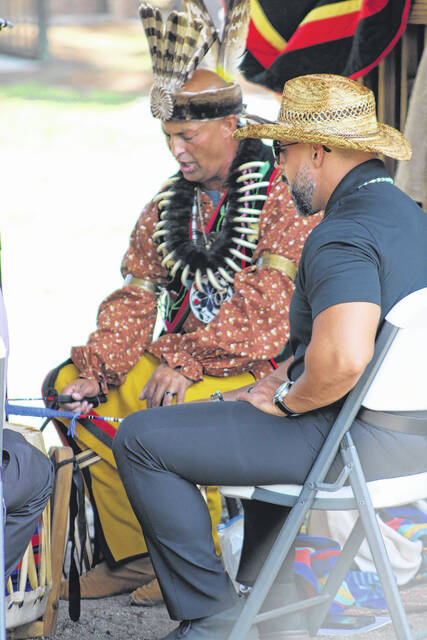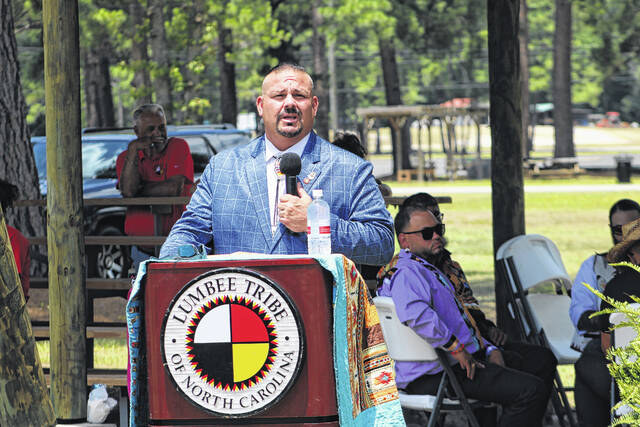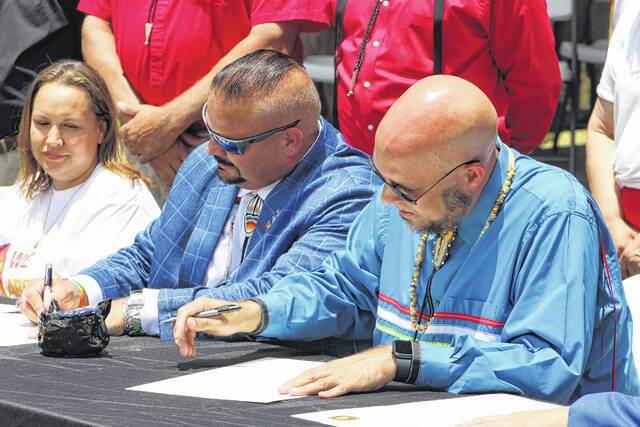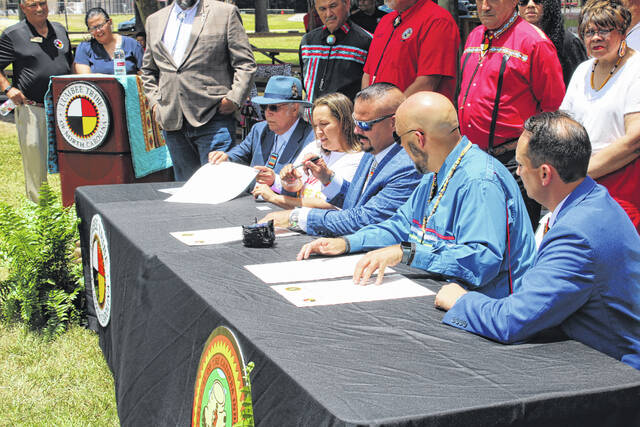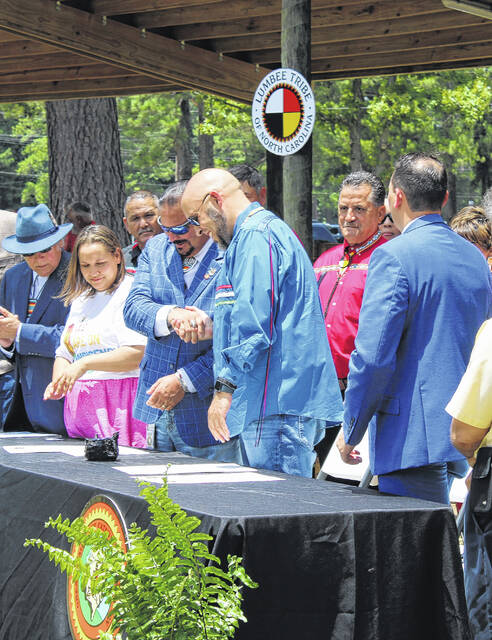
Lumbee Tribe Chairman John Lowery and Catawba Nation Chief Brian Harris shake hands Thursday after signing a Government-to-Government Principles of Agreement. The document acts like a modern-day treaty between the two tribal nations.
Tomeka Sinclair | The Laurinburg Exchange
MAXTON — History was made this week as the Lumbee Tribe of North Carolina and the Catawba Nation of South Carolina joined forces after both tribal heads signed a Government-to-Government Principles of Agreement.
The document acts like a modern-day treaty between the two tribal nations and marks a “new day of guided principles between the two nations as they have agreed to move forward together in friendship and partnership, while also protecting the sovereignty of each nation.”
“This agreement represents a significant milestone in our shared history and is a testament of our commitment to mutual respect and cooperation … This agreement is a symbol of our efforts to move beyond the mistakes of the past and forge a new partnership based on trust, respect and collaboration,” said Brian Harris, chief of the Catawba Nation.
Lumbee Tribal Chairman John Lowery said the act marks a wonderful day in the “land of the Lumbee as we welcome our brothers and sisters from the Catawba Nation.”
“This is a historical day and I know it is one that our ancestors are looking down and they’re smiling,” Lowery said. “They’re smiling today. We have made them proud today … This agreement today puts us in lockstep as we work and walk together on cultural issues, social issues, health issues, economic issues and many more.”
The principle’s agreement signing took place at the Lumbee Tribe Cultural Center on Thursday, which fell on the Summer Solstice and was held in conjunction with a fire ceremony, where both chairman and chief lit a fire to unify a flame.
Both tribal heads have fought the same fight over the year, according to Chief Harris.
“I have walked the halls of Congress with John,” Harris said. “We have celebrated small victories together. We’ve got pissed off together and we pissed some people off.”
“For too long the relationships between native tribes have been marred by conflict, misunderstanding and exploitation,” Harris continued. “Both tribes know that all-too well. We’ve been talked about like dogs. We have been told that we are just a gathering of people … But, at the end, Ye Iswa has been around for thousands of years and we will continue being around for thousands of years.”
Chairman Lowery said that as traditions go, tribes aren’t supposed to work together.
“We’re strong independent sovereigns,” Lowery said. “We stand alone, we do are thing, we fight that fight against the federal government, against the state government, against the local governments trying to get in our way … That has been taught to us … That’s all fine and well but there’s times when everybody needs somebody. There’s times when everybody needs to come together. There’s times when you can’t do stuff alone. You can walk alone.”
Lowery said that as chairman of the tribe, his administration has placed an emphasis on partnerships and collaboration.
“This partnership stands out as the most significant one in my tenure and ensures a bright future for our two nations,” Lowery said.
Lowery appeared to compare the two tribe’s unification to the relationship with the Eastern Band of the Cherokee.
“We have friends up in the mountains who have done nothing but isolated themselves. They have purposely isolated themselves. They have purposely pushed themselves in the corner. So while they’re on one fringe, we’re totally on the other where we are holding hands and walking together,” the Lumbee chairman said.
Longstanding relationship
According to the Lumbee Tribe, the Catawba Nation and the Lumbee Tribe of N.C. have had a longstanding relationship with families moving between the two tribes for centuries. The Catawba have been along the banks of the Catawba River since time immemorial, but their pottery has been documented for at least 6,000 years in the Carolinas. The Catawba historically spanned from Virginia down to South Carolina. They are known as Ye Iswa, the People of the River. The Catawba Nation had their recognition restored in 1993, after being terminated in 1959.
The United States recognized the Lumbee in 1956, with state recognition in 1885. During early times of migration, ancestors of the Lumbee Tribe, the Cheraw, often traveled and stayed for extended time periods in the Catawba Homeland in South Carolina. In the lands that are home to the Lumbee people, archaeological data demonstrates a continuous Indian presence dating back to 12,000 years. The Lumbee are known as the “People of the Dark Water.” The Lumbee Tribal Territory has been a “cultural crossroads” for thousands of years.
“We talk a lot about history and we say and we hear that history dictates this and history dictates that, well one good thing about history is that it absolutely affirms when you read it, understand it and study it, it makes sure that you don’t repeat the mistakes of the past and today we are laying them burdens down and we are coming together as one in unity,” the Catawba chief said.




